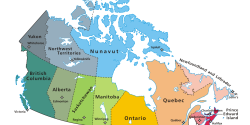Canada’s broadcast regulator has put out a call for radio applications to reach urban Aboriginal communities in five cities: Ottawa, Toronto, Calgary, Edmonton and Vancouver. “There is a pressing need to serve the Aboriginal community as a whole given that issues vitally important to Aboriginal Canadians are not fully covered or addressed at all in non-Native media,” the notice says.
This is a really big deal, radio-wise. The Canadian Encyclopedia identifies 1.8 million Aboriginal people in that country of 35.16 million. The most well known of these are the Inuit of the north. But another 1.3 million count as people of First Nations heritage: members of 634 different groups who speak 50 distinct languages. Last but not least are the Métis—people of mixed European and Aboriginal background, not a few of whom live in the five aforementioned cities situated in Canada’s southernmost areas.
The call comes from the Canadian Radio-television Telecommunications Commission (CRTC). Applicants must detail the following:
- plans and commitments regarding Aboriginal programming, including how the applicant’s commitments will reflect the interests and needs of the Aboriginal population to be served, foster the development of Aboriginal cultures and help preserve Aboriginal languages;
- the capacity of the proposed business plan, whether commercial or non-commercial, to sustain the programming plans set out in the application; and
- plans to provide for broad participation by the Aboriginal population of the region served in the governance, operation and programming of the station.
The stringency of the language is perhaps informed by the fact that the CRTC feels a bit burned by the last entity to which it gave this job: Aboriginal Voices Radio Inc. In June the agency revoked AVR’s licenses in those five cities. After a lengthy public hearing, the commission concluded that the company had epically failed on its key broadcast commitment: “regular daily local newscasts on each station that include at least five distinct local news stories of direct and particular relevance to the Aboriginal community within the market served.” Plus the operation blew it on filing program logs, financial statements, or updates on its progress, the CRTC ruled—all conditions for its licenses.
Here’s a moment from the hearing transcript that made me wince. It’s an exchange between CRTC President Jean-Pierre Blais and broadcast consultant David Bray, a member of the group speaking for AVR at the event. Keep in mind that the company has had these licenses since 2002:
“THE CHAIRPERSON: So, how many on-air staff do you have in each station currently?
MR. BRAY: We have not got the local presence right now because we’re just in the process of conversion. Right now we just have a couple of announcers working across the board.
But that having been said, that’s our — again, we’re relatively new to this operation and we are in the process of hiring local people in each of the markets.
THE CHAIRPERSON: How are you able to meet your current obligations with so few on-air staff?
MR. BRAY: We are not currently — if I can say we, if you don’t mind — . . . We are not currently in compliance on all issues as [AVG President] Jamie [Hill] has noted, but we have set out a plan and a timetable to bring the remaining issues into compliance, specifically, the local content and the news content.”
Shortly after the revocation of AVR’s licenses, the Canadian Association of Aboriginal Broadcasters weighed in on the decision: “Taking into account the constant breaches, CAAB feels that the CRTC had no choice but to take this action given that Aboriginal communities in these urban market must have access to music and information that speaks to their realities, a goal that AVR has been criticised for failing to meet.”
It gets more complicated, however. A court has granted AVR the right to appeal the CRTC’s decision. The question I suppose is to whom the company will appeal the ruling. My guess is that if it is the CRTC again, the Commission’s decision will stand. If elsewhere, I’m not sure. In any event, the agency seems to think that it will prevail.
“Under these unique circumstances, the Commission considers it appropriate to issue a call for applications for services that could fill any gap as it relates to serving Aboriginal Canadians in the above-noted markets,” the statement concludes.



